Platform workers get a raw deal even as ‘employees’ get attractive Covid benefits
Dear Reader,
“Six months’ bed rest. Six months’ bed rest. Six months’ bed rest.”
Golla Mahesh sounds apologetic. He is unable to figure out how he will feed his family of four — including two young daughters — if he does not return to the streets of Hyderabad delivering food.
Mahesh, a food delivery executive, met with an accident on April 27 when he was biking from Miyapur X Road to Kousalya Colony to make a delivery for Swiggy. Although he qualifies as a frontline worker and often puts his life on the line due to the nature of his job, he is now struggling to pay his medical bills. Worse still, he will not be able to work for the next six months.
(Swiggy has claimed that: “On 27th April, our partner was promptly admitted to Mamata Academy of Medical Sciences Hospital (Bollaram Industrial Area, Hyderabad) and was covered under cashless claim through our insurance partner. While there were some delays from the hospital, a complete cashless claim was enabled and the initial bill of INR 51,000 has been approved. Any additional medical expenses incurred at the time of discharge will also be covered under our medical insurance plan. His request for loss of pay was also discussed and a few documents were requested to be submitted by him which entitles him to a minimum guarantee for up to 3 months.”)
Mahesh’s story is not unique. One frequently comes across similar tales of woe in the gig economy. Gig workers have been protesting against falling incomes for the past few years. But the Covid-19 pandemic has brought them to their knees.
However, deep-pocketed tech companies like Swiggy, Zomato, Ola, Uber, Amazon or Flipkart are doing little to help ease the pain of gig workers, people in temporary, on-call or contract positions. In contrast, most of these companies have announced a slew of benefits, including four-day working weeks, unlimited paid leaves, in-house counselling sessions and more, for their ‘employees’.
“Technology companies continue to invest hundreds of crores in scaling up their businesses, and it is achieved with the gig workers’ blood and sweat. But when they have their scale, they forget the people who helped them become successful aggregators in the first place,” says Shaikh Salauddin, national general secretary of the Indian Federation of App-Based Transport Workers (IFAT).
According to Salahuddin, none of the platforms has come forward to extend any help to gig workers who have fallen ill or succumbed to Covid-19. “In my home state of Telangana, nine gig workers have reportedly died and 630 have tested positive for Covid in the past 10 days. The aggregators respond on my Twitter timeline (when these things are posted). But they do not answer when we follow up in person for help,” he adds.
Of course, one may argue that gig workers are billed by the hours they put in or the kilometres they travel, and companies are not liable to cover their medical expenses. But given that the pandemic poses severe health hazards for frontline workers, experts believe that tech companies should cover any loss of pay if their gig workers contract the disease while on duty.
Although food delivery companies Swiggy and Zomato have said they will cover loss of pay and hospitalisation expenses in such cases, cab aggregators Ola and Uber do not have a similar scheme in place. While on the other hand, Urban Company, the home services platform that recently became a unicorn, says that it has set up a fund of INR 1.5 Cr through employee contribution to support the gig workers on its platform.
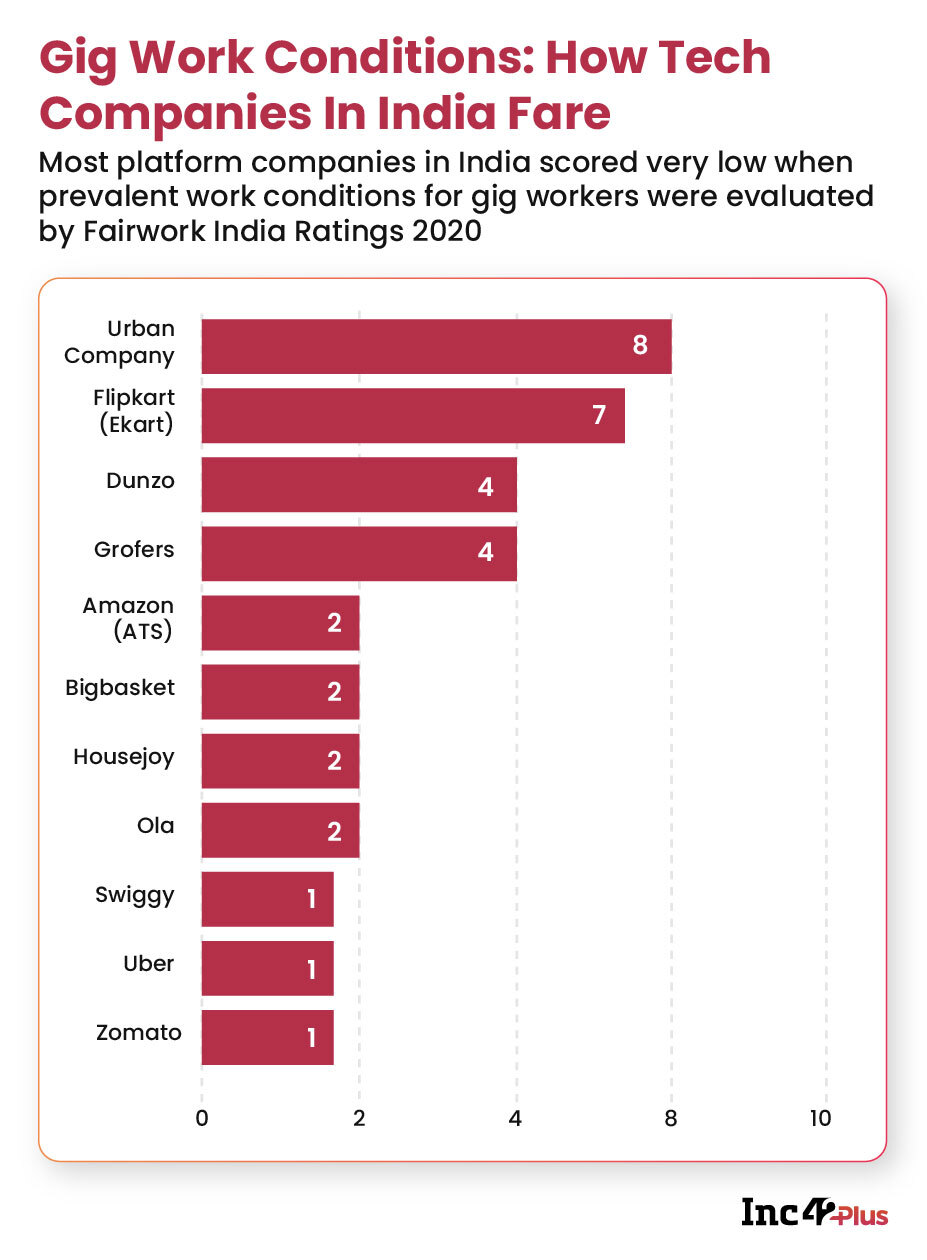
Unit Economics Pinches Gig Workers Hard
Blue-collar gig workers have been complaining about getting the short end of the stick for the past few years. But the pandemic has worsened their plight due to dwindling payments. A couple of drivers in Delhi-NCR, who spoke to Inc42, said they had to leave ride-sharing platforms as the number of trips came down drastically and the incentives had also depleted.
Before Covid-19 lockdowns, there was a weekly incentive of INR 1,500 or so if a driver could complete 50 trips a week. Now, this has been reduced to INR 800-900. Besides, the toll tax of INR 100 at inter-state borders, which was earlier paid back to drivers, is now withheld in certain cases, although the amount is always included in a user’s fare.
For food delivery executives, the scenario is equally grim. Ajay (name changed), a delivery executive who operates in Delhi’s Malviya Nagar, says that he used to earn INR 800-900 a day before the pandemic, but now he makes INR 400-500 on a good day. “The biggest change that is hurting us is the incentive structure. Earlier, one used to get around INR 800 for completing 18-20 orders per day,” he explains.
Zomato and Swiggy refused to share the numbers when asked about the pay structure, while Ola and Uber India did not respond to our queries. According to an industry executive who does not want to be named, “It is fluid and keeps on changing based on different factors such as geography, distance and the time spent on a delivery. The equations are quite complicated, and it is not easy to put your finger on a particular variable and say here lies the problem.”
The root cause behind the overall pay reduction is not difficult to discern, though. Today, most of the mature consumer tech segments have been consolidated into a two-way or three-way race, and the key players spent billions of dollars of investment money to vanquish smaller competitors. After the bloodbath, the Goliaths are now trying to make their unit economics work, which means making more money than the cost on an average order.
Take, for example, Zomato that has recently filed for an IPO. The company claims that it achieved an average margin of INR 22.9 per order from April to December 2020, a massive improvement from the negative INR 30.5 margin logged in FY2020 (April 2019-March 2020). Not surprisingly, one of the largest categories under which it saved money was the delivery cost which came down by more than 14% between the two periods under consideration.
“While Zomato would earlier pay agents INR 300, INR 600 and INR 800 for completing 11, 16 and 20 orders, respectively, in a day, delivery executives say that the current structure is nowhere as attractive. They claim that the company has reduced the payments to INR 250 for 10 orders, INR 400 for 15 orders, INR 600 for 19 orders and INR 850 for 23 orders a day,” says Salauddin of IFAT.
Facing the ire of delivery workers earlier this year, Zomato founder and CEO Deepinder Goyal declared in February that the firm would revise its pay structure upwards by 7-8%. But delivery executives feel that they have been given a raw deal as petrol and diesel prices have risen 20-30% in the past year.
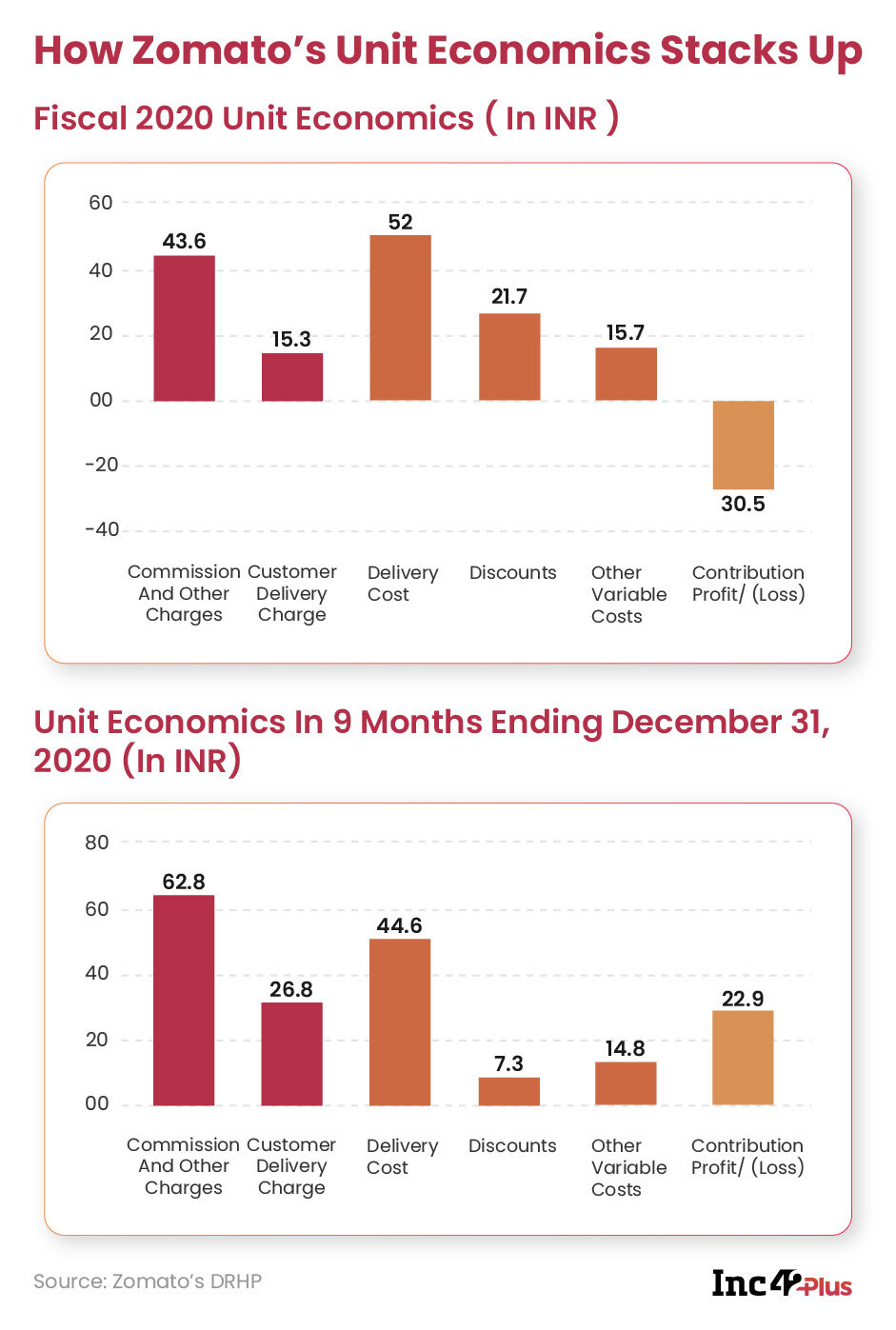
Government Policy Fails Gig Workers
While big tech and unicorn startups have fleeced blue-collar gig workers to improve their business maths, experts feel that the government has also remained tone-deaf to their needs. For instance, it deferred the notification of the social security code in April, which would have mandated that gig platforms deploy 5% of their revenues to create a fund for workers’ welfare.
Moreover, the Industrial Relations Code, 2020, applies only to ‘employees’ working in an ‘industrial establishment’, excluding platform workers. It means all beneficial provisions related to unionisation, collective bargaining and fair procedures for hiring and firing do not apply to them. Likewise, the Occupational Safety, Health and Working Conditions Code, 2020, does not mention platform workers. As a result, companies that run aggregation-based apps have no obligation to ensure a safe and healthy working environment or compensate workers if they suffer any injury or death in the course of work.
“Gig workers continue to be the modern precariat in the service sector for many reasons. To begin with, the central government has rather inadequately sought to address (through the social security code) the precarious conditions of gig workers without giving it much thought. Second, the legislative attempt is greatly weakened as they are not included in three labour codes,” says K.R. Shyam Sundar, a professor of human resource management practice at XLRI-Xavier School Of Management.
While the Indian government continues to dilly-dally on gig workers’ rights, the Biden administration blocked on May 6 a Trump-era rule that would have made it easier to classify gig workers (who work for companies like Uber and Lyft) as independent contractors instead of employees. This signals a potential policy shift towards greater worker protection.
The U.S. labour secretary said that his department would have conversations in the coming months with companies that employ gig labour to make sure that workers have access to consistent wages, sick time, healthcare and “all of the things that an average employee in America can access”.
Interestingly, Uber lost a long-running employment tribunal case in the UK Supreme Court in February this year, with the court dismissing the ride-hailing giant’s appeal and reaffirming earlier rulings that drivers who brought the case are workers, not independent contractors. The case is expected to have major ramifications for the business model of gig economy platforms in the UK and regionally, as similar cases are ongoing in European courts.
Will the regulations in the US and the UK make Indian policymakers sit up and take notice? The developed world often has a different rule book for the emerging economies, whether it concerns political demagoguery, environmental crises or labour rights. The reason: It likes to put its house in order while maximising the return on investments made in other parts of the world.
But the world’s largest democracy cannot afford to fall into such a trap. More so, when the pandemic has broken the back of countless underprivileged families across the country. It is the government’s responsibility to ensure that policies are implemented at the earliest to secure the rights and livelihoods of India’s gig workers. Otherwise, the internet will not be perceived as a tool for economic upliftment any more. It will be seen as another instrument of exploitation in the hands of corporates.
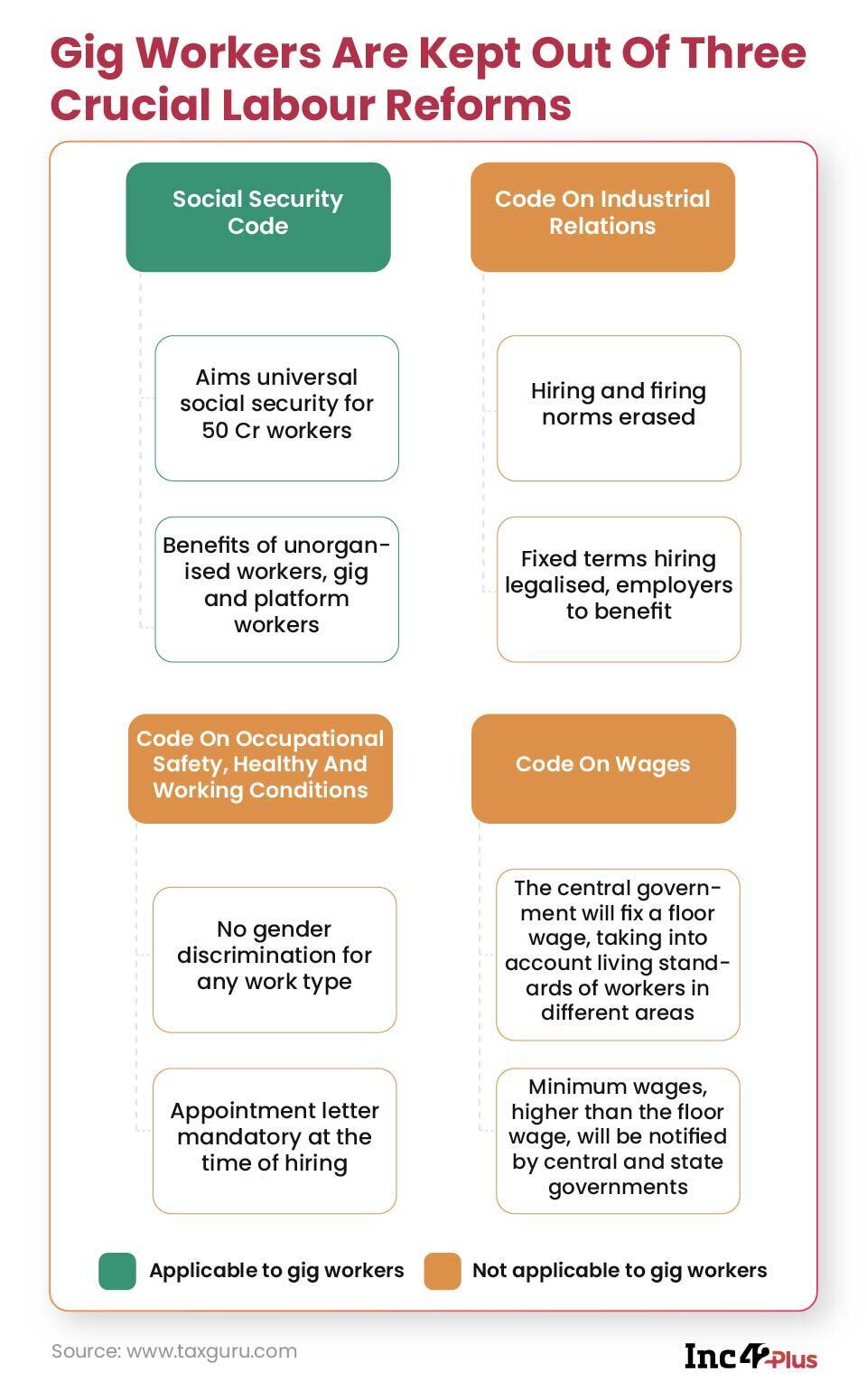
A Rider’s Call For Help
Just as I was beginning to write this newsletter, Golla Mahesh (mentioned in the beginning) called me. A day earlier, he had confidently put forth his story and detailed how Swiggy had been unfair to him. But this time around, he sounded unsure.
Mahesh said he would be discharged from the hospital the next day but did not have INR 10,000 for cab fare that the family would require to go back from Hyderabad to their village near Kurnool.
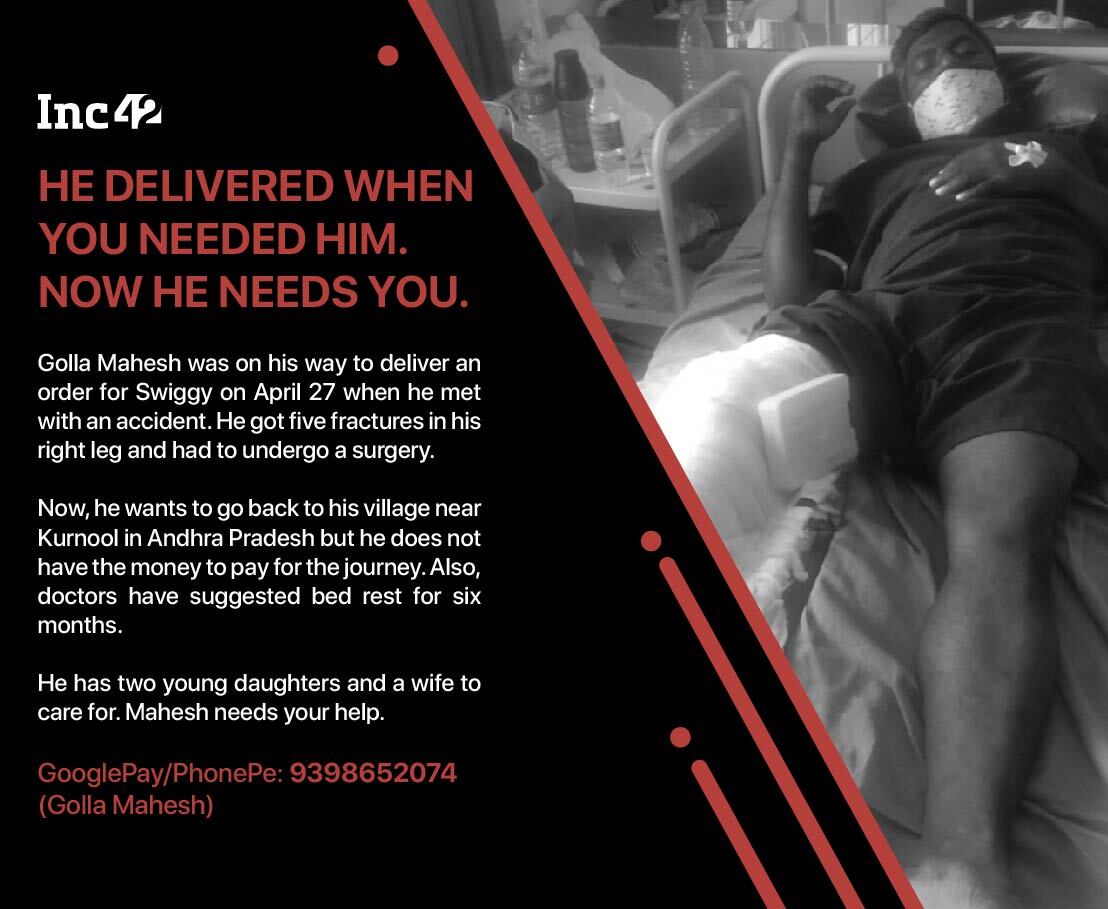
Grocery Delivery On A Roll
The pandemic has been unkind to gig workers, but delivery companies have gone from strength to strength. On Thursday (May 21), Bengaluru-based hyperlocal delivery company Dunzo announced that since January 2021, it had witnessed 350% growth in medicine orders, while consumables like groceries, fresh produce and daily staples grew 318% as of April 2021.
Meanwhile, ET reports that online grocery startup BigBasket clocked gross sales of $1.1 billion, or INR 8,000 Cr, in FY21. It is the second vertical ecommerce player in India to reach this milestone after online fashion retailer Myntra.
The fact that BigBasket’s revenue of INR 3,818 Cr in FY20 was 109.8% lower than its sales in the last fiscal shows how the grocery delivery business got an unprecedented boost due to pandemic-induced lockdowns and social distancing.
It is not surprising that the online grocery space has caught the fancy of the storied Tata group, the oil-to-telecom conglomerate Reliance Industries and the global behemoth Amazon. The online grocery market in the country, worth around $241 Bn (according to Statista estimates), is also seen as the way to deep-dive into users’ digital lives.
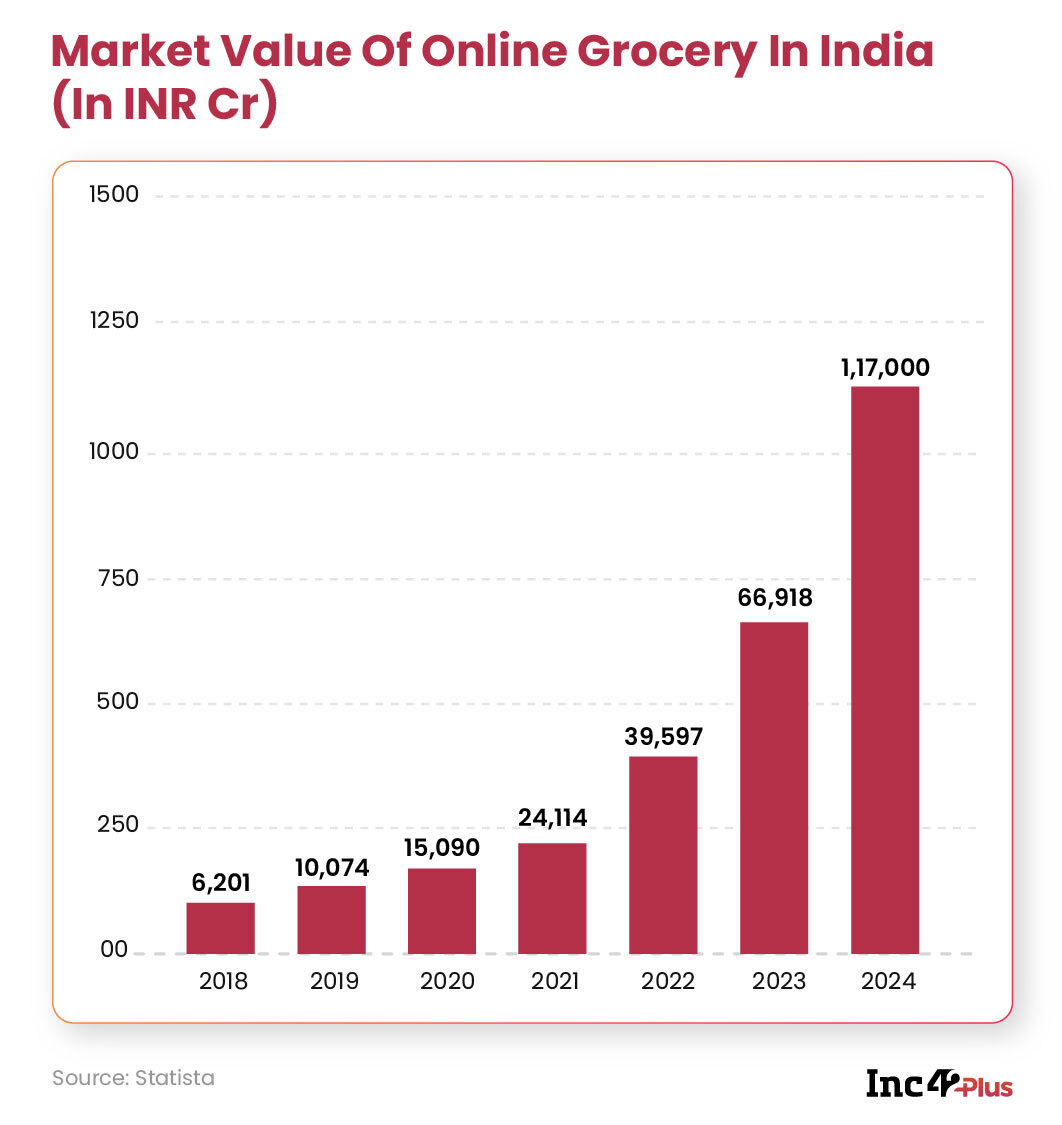
Tech Makes Hay While Gig Workers Suffer
As grocery platforms go bonkers over rising demand and expansion needs, they are looking to onboard more techies at a fast clip. But the challenge is to stand out in a market that is overcompensating techies, according to several founders’ tweets.
Albinder Dhindsa, founder and CEO of Grofers, has tried the shock-and-awe strategy by announcing in big, bold words that the grocery delivery platform is accepting bitcoin payments. But the small print below says that the firm is looking for engineers and clarifies that cryptocurrency is not yet an acceptable medium of exchange for real-world things like veggies and meat.
![[The Outline By Inc42 Plus] Second Wave Reopens Gig Workers’ Wounds](https://inc42.com/wp-content/uploads/2021/05/Outline66_Graphs-05-2.jpg)
Although white-collar workers in startups get salary packages and benefits in sync with global standards, nearly 90% of Indian gig workers have lost their incomes during the pandemic, according to an August 2020 survey by Flourish Ventures, a VC fund focussing on fintech. It says that Indian gig workers enjoyed above-average earnings before the pandemic. But by August 2020, nearly nine out of 10 were making less than INR 15,000 a month ($200).
It is high time that investors, startup founders and the government realise that gig workers are the fulcrum of the aggregator economy. One can develop any number of apps and AI algorithms, but not a single package can be delivered without human help. Life will be extremely difficult for all amid this pandemic if frontline workers do not get enough support to survive the troubled times.
Until next time,
Deepsekhar
Last Updated | 20:42, May 22
Swiggy’s claim on the help extended to delivery executive Golla Mahesh was incorporated in the story.




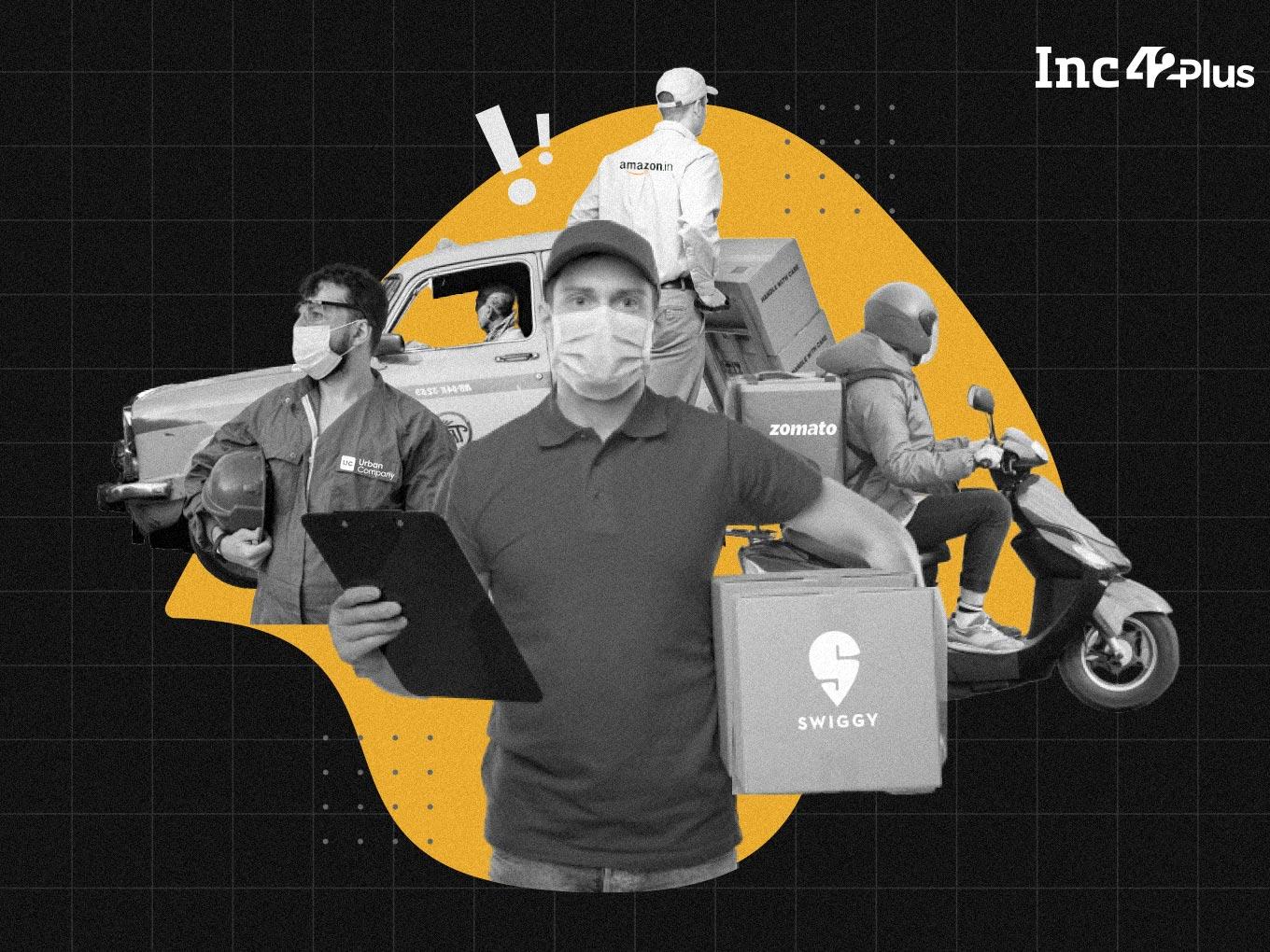





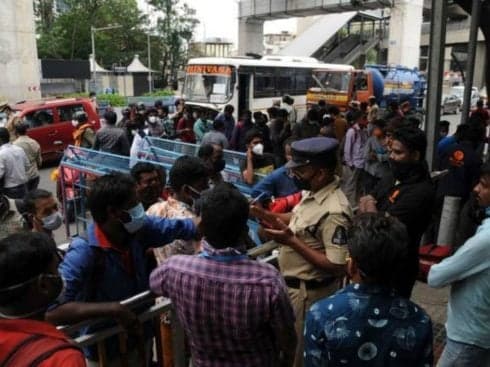
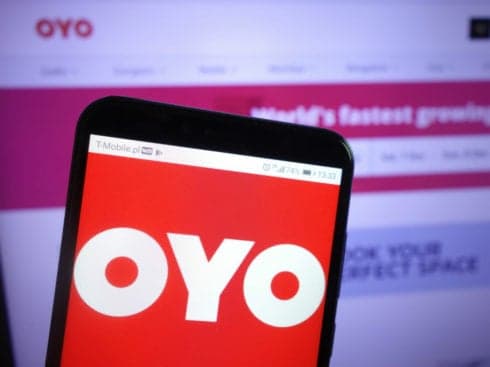

![[The Outline By Inc42 Plus] Second Wave Reopens Gig Workers’ Wounds-Inc42 Media](https://asset.inc42.com/2023/09/featured.png)
![[The Outline By Inc42 Plus] Second Wave Reopens Gig Workers’ Wounds-Inc42 Media](https://asset.inc42.com/2023/09/academy.png)
![[The Outline By Inc42 Plus] Second Wave Reopens Gig Workers’ Wounds-Inc42 Media](https://asset.inc42.com/2023/09/reports.png)
![[The Outline By Inc42 Plus] Second Wave Reopens Gig Workers’ Wounds-Inc42 Media](https://asset.inc42.com/2023/09/perks5.png)
![[The Outline By Inc42 Plus] Second Wave Reopens Gig Workers’ Wounds-Inc42 Media](https://asset.inc42.com/2023/09/perks6.png)
![[The Outline By Inc42 Plus] Second Wave Reopens Gig Workers’ Wounds-Inc42 Media](https://asset.inc42.com/2023/09/perks4.png)
![[The Outline By Inc42 Plus] Second Wave Reopens Gig Workers’ Wounds-Inc42 Media](https://asset.inc42.com/2023/09/perks3.png)
![[The Outline By Inc42 Plus] Second Wave Reopens Gig Workers’ Wounds-Inc42 Media](https://asset.inc42.com/2023/09/perks2.png)
![[The Outline By Inc42 Plus] Second Wave Reopens Gig Workers’ Wounds-Inc42 Media](https://asset.inc42.com/2023/09/perks1.png)

![[The Outline By Inc42 Plus] Second Wave Reopens Gig Workers’ Wounds-Inc42 Media](https://asset.inc42.com/2023/09/twitter5.png)
![[The Outline By Inc42 Plus] Second Wave Reopens Gig Workers’ Wounds-Inc42 Media](https://asset.inc42.com/2023/09/twitter4.png)
![[The Outline By Inc42 Plus] Second Wave Reopens Gig Workers’ Wounds-Inc42 Media](https://asset.inc42.com/2023/09/twitter3.png)
![[The Outline By Inc42 Plus] Second Wave Reopens Gig Workers’ Wounds-Inc42 Media](https://asset.inc42.com/2023/09/twitter2.png)
![[The Outline By Inc42 Plus] Second Wave Reopens Gig Workers’ Wounds-Inc42 Media](https://asset.inc42.com/2023/09/twitter1.png)




 Ad-lite browsing experience
Ad-lite browsing experience